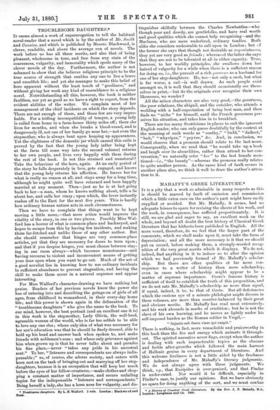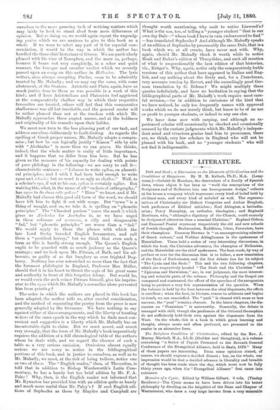MAHAFFY'S GREEK LITERATURE.*
Ir is a pity that a work so admirable in many respects as this is should be marred by fault of omission and commission which a little extra care on the author's part might have easily supplied or avoided. But Mr. Mahaffy, it seems, had no adequate leisure to spare for revising the sheets of his work, and the work, in consequence, has suffered proportionately. It is still, we are glad and eager to say, an excellent work on the whole, and beyond all doubt the best history of Classical Greek literature that has hitherto been published in English. All the more vexed, therefore, do we feel that the larger part of the comments, which we shall make upon it, must take the form of depreciation ; and all the more necessary is it that we should put on record, before making them, a strongly-worded recog- nition of the very great merits which it displays. We do not, indeed, find anything in it to induce us to alter the opinion which we had previously formed of Mr. Mahaffy's scholar- ship. But there are other qualities of far more con- sequence to a writer of history than mere scholarship, even in cases where scholarship might appear to be a matter of supreme importance. Grote's famous history is sufficient of itself to establish the truth of this proposition, and we do not rate Mr. Mahaffy's scholarship as more than equal, if equal, indeed, it be, to that of Grote. But all deficiencies which the curious eye of a minute philologist might discern in these volumes, are more than counter-balanced by their great and obvious merits. Mr. Mahaffy has read most extensively, and his work abounds in marks of erudition ; but he is not the slave of his own learning, and be moves as lightly under his self-imposed burden as the Roman soldier in Virgil,— " Injusto sub fasce viam qui carpit."
There is nothing, in fact, more remarkable and praiseworthy in this book than the fire and energy which animate it through- out. The spirited narrative never flags, except when the author is dealing with such impracticable topics as the obscure and feeble after-growths which followed the main harvest of Hellenic genius in every department of literature. And this welcome liveliness is not a little aided by the freshness and independence of Mr. Mahaffy's literary judgments. We do not always agree with these judgments. We think, e.g., that Euripides is over-praised, and that Pindar is under-rated. Nor would it be difficult, especially in Pindar's case, to justify our opinions. But we have obviously no space for doing anything of the sort, and we must confine
• A History of Classical Greek Literature. By the Bell. 3, P. Ifshaffy, London : Longman. and eo. 1880. ourselves to the more pressing task of noticing matters which may fairly be held to stand aloof from mere differences of opinion. Before doing so, we would again repeat the ungrudg- ing praise which we are anxious to give to this book as a whole. If we were to select any part of it for especial com- mendation, it would be the way in which the author has handled the three chief historians of Greece. We are particularly pleased with his view of Xenophon, and the mote so, perhaps, because it bears out very completely, in a sober and quiet manner, the brusque and cavalier verdict which we recently passed upon an essay on this author in Hellen ica. The lyric writers, also, always excepting Pindar, seem to be admirably treated by Mr. Mahaffy ; and we may say the same, with some abatement, of the Orators. Aristotle and Plato, again, have as much justice done to them as was possible in a work of this kind ; and if keen Aristotelians and Platonists feel aggrieved at the comparatively shallow way in which their respective favourites are treated, others will feel that this comparative shallowness was all but inevitable, and the general reader will be rather pleased than not at the freedom with which Mr. Mahaffy approaches these august names, and at the boldness and originality of his remarks upon their foibles.
We must now turn to the less pleasing part of our task, and address ourselves deliberately to fault-finding. As regards the spelling of Greek proper names, Mr. Mahaffy adopts a compro- mise; but how he can logically justify " Kimon " side by side with " Alcibiades " is more than we can guess. He thinks, indeed, that the whole matter is really of little importance, and it happens that we differ from him here. But he has given us the measure of his capacity for dealing with points of pure philology in the following—we are, sorry to call it— characteristic sentence :—" I choose to write rythm, on phoneti- cal principles ; and I wish I bad been bold enough to write ryme and re/uric; but no word is so ugly as rhythm." Well, to a scholar's eye, if not to his ear, ryllint is certainly uglier. But waiving this, what, in the name of all " rackers of orthography," has ryme to do dans celle gailiro ? "Rime" we know, and if Mr. Mahaffy had chosen this good old form of the word, we should have left him to fight it out with usage. But "ryme" is a thing of naught, and so, we take it, is spelling on "phonetic principles." The " Classical purism" (save the mark !) which gives us Alschulos for Aeschylus is, as we have urged in these columns ad nauseam, a silly and disagreeable "fad," but " phouetic principles" are worse than a "fad." We would apply to them the phrase with which the late Lord Derby branded English hexameters, and call them a "pestilent heresy," but we think that even such a term as this is hardly strong enough. The Queen's English ought to be guarded with as much jealousy as the Queen's mintage; and we look upon Mr. Pitman, of Bath, and his ad- herents, as guilty of as flat burglary as ever frighted Dog- berry. Nothing has ever astonished us more than the fact that the foremost philologist in England, Professor Max Muller, should find it in his heart to thrust the aegis of his great name and authority in front of this forgetive felony. But would he, or would even the arch coiner Pitmau himself, give his imprim- atur to the ryme N'vhich Mr. Mahaffy's cowardice alone prevented him from printirg ?
The order in which the authors are placed in this book has been adopted, the author tells us, after careful consideration, and the method of separating the poetry from the prose is now generally adopted by the Germans. We have nothing to say against either of these arrangements, and the liberty of treating writers of the same epoch in the way which be finds most con- venient and suggestive is a liberty which Mr. Mahaffy has an incontestable right to claim. But we must assert, and assert very strongly, that the form of Mr. Mahaffy's book imperatively requires the addition of a full chronological table of the authors whom he deals with, and we regard the absence of such a table as a very serious omission. Omissions almost equally serious we are sorry to notice in the bibliographical portions of this book, and in justice to ourselves, as well as to Mr. Mahaffy, we must, at the risk of being tedious, notice one or two of these. The "English reader," then, of Theocritus, is told that in addition to Bishop Wordsworth's Latin Com- mentary, he has a, handy but too brief edition by Mr. F. A. Paley ! Why, then, is the English reader not informed that Mr. Kynaston has provided him with an edition quite as bandy and much more useful than Mr. Paley's ? If such English edi- tions of Sophocles as those by Blaydes and Campbell are thought worth mentioning, why omit to notice Linwood's ? What is the use, too, of telling a "younger student" that in our own day Dale—" whose book I have in vain endeavoured to find" —has translated Sophocles ? And although Mr. Mahaffy speaks of an edition of Sophocles by presumably the same Dale, that is a book which we, at all events, have never met with. why, again, should Mr. Mahaffy think it worth while to notice Haak and Duker's edition of Thucydides, and omit all mention of what is unquestionably the best edition of that historian, viz., Kriiger's. Why, again, notice only the comparatively feehle versions of this author that have appeared in Italian and Eng- lish, and say nothing about the lively and, for a Frenchman, very accurate version by Zevort, and the exceedingly good Ger- man translation by G. Bohme ? We might multiply these queries indefinitely, and have no hesitation in saying thatthe bibliographical parts of Mr. Mahaffy's work require most care- ful revision,—for in addition to omissions of the kind that we have noticed, he only too frequently names with approval works which we do not merely think, but know to be of no use or profit to younger students, or indeed to any one else.
We have done now with carping, and although an ex- perienced scholar will occasionally be shocked and occasionally amused by the curious judgments which Mr. Mahaffy's indepen- dent mind and vivacious genius lead him to pronounce, there are, we think, very few scholars in England who will not be pleased with his book, and no "younger students" who will not find it indispensable.



































 Previous page
Previous page